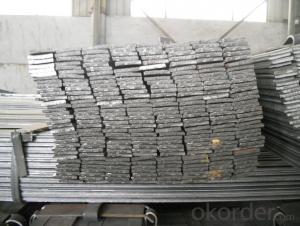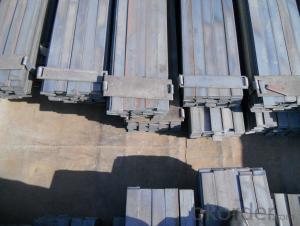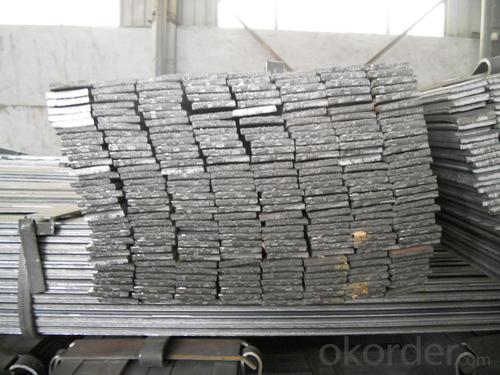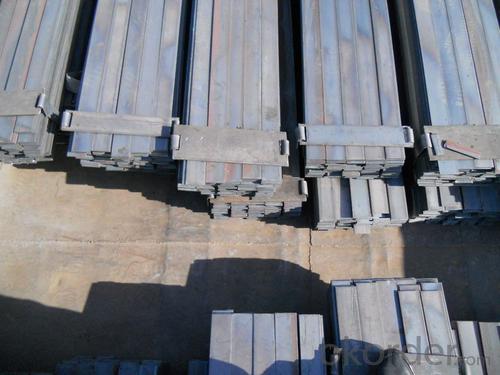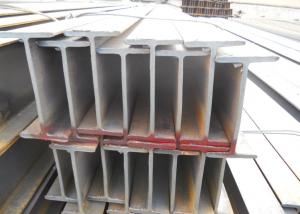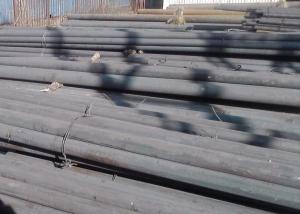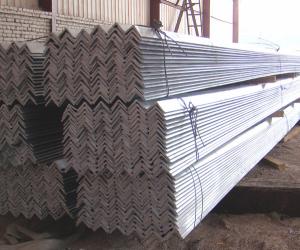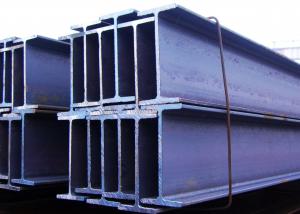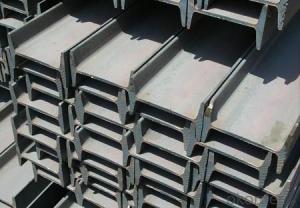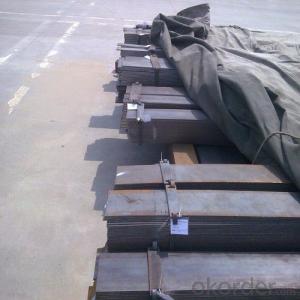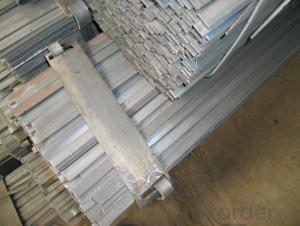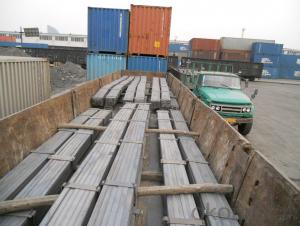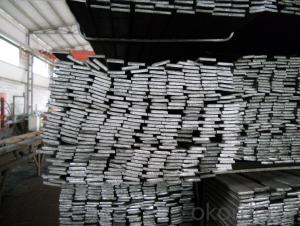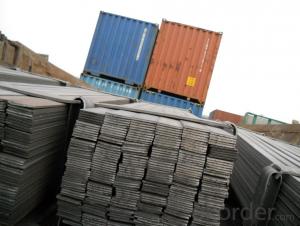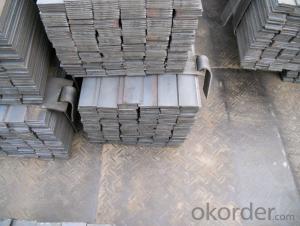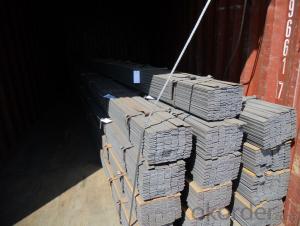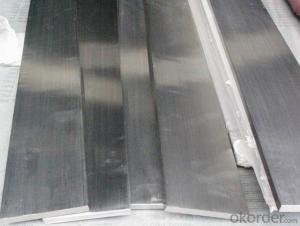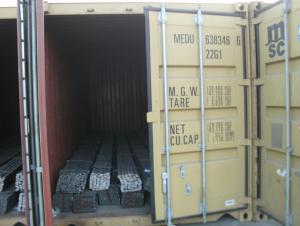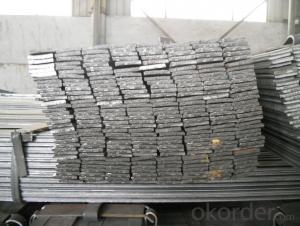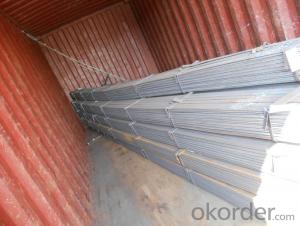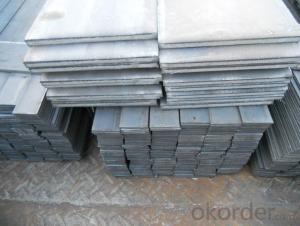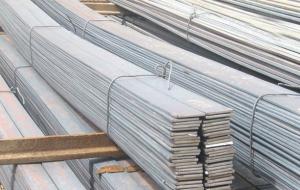GB Standard Steel Flat Bar with High Quality 50mm
- Loading Port:
- Tianjin
- Payment Terms:
- TT OR LC
- Min Order Qty:
- 25 m.t
- Supply Capability:
- 15000 m.t/month
OKorder Service Pledge
OKorder Financial Service
You Might Also Like
Product Description of GB Standard Steel Flat Bar with High Quality 50mm:
Specification of GB Standard Steel Flat Bar with High Quality 50mm:
-Standard: GB
-Material: Q235
-Length: 6m, 12m
-Size:
Size(mm) | Mass(Kg/m) |
50*5 | 1.96 |
50*8 | 3.14 |
50*10 | 3.92 |
Package & Delivery of GB Standard Steel Flat Bar with High Quality 50mm:
1.The steel flat bars will be packed in bundle with steel wire at each end of every bundle and color marking in order to help the customer to recognize his goods more easily at sight.
2. And the steel flat bars could be loaded into 20ft or 40ft container, or by bulk cargo. If the weight of each bundle reaches more than 3.5 mt, the loading by break bulk cargo should be choosed. When the weight of each bundle reaches less than 3mt, the loading by container should be choosed.
3.As for the transportaion from mill to loading port, the truck will be usually used. And the maximum quantity for each truck is 40mt.
4.All in all, we could do in accordance with customer's request.
FAQ:
Q1: Why buy Materials & Equipment from OKorder.com?
A1: All products offered by OKorder.com are carefully selected from China's most reliable manufacturing enterprises. Through its ISO certifications, OKorder.com adheres to the highest standards and a commitment to supply chain safety and customer satisfaction.
Q2: How do we guarantee the quality of our products?
A2: We have established an advanced quality management system which conducts strict quality tests at every step, from raw materials to the final product. At the same time, we provide extensive follow-up service assurances as required.
Q3: How soon can we receive the product after purchase?
A3: Within three days of placing an order, we will arrange production. The shipping date is dependent upon the quatity, how many sizes you want and the plan of production, but is typically 1 month to 2 month days from the beginning of production.
Images of GB Standard Steel Flat Bar with High Quality 50mm:
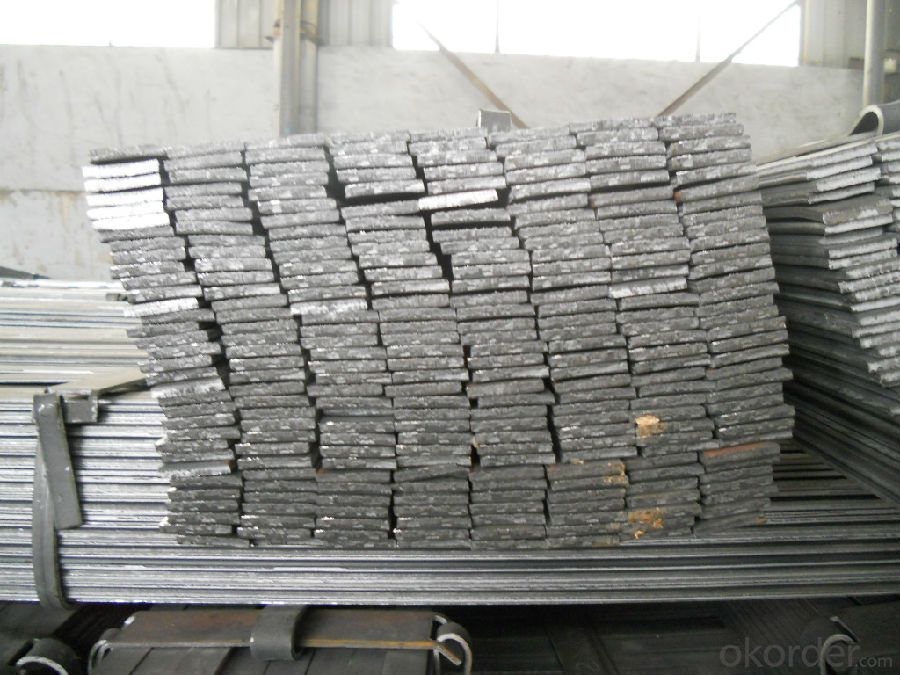
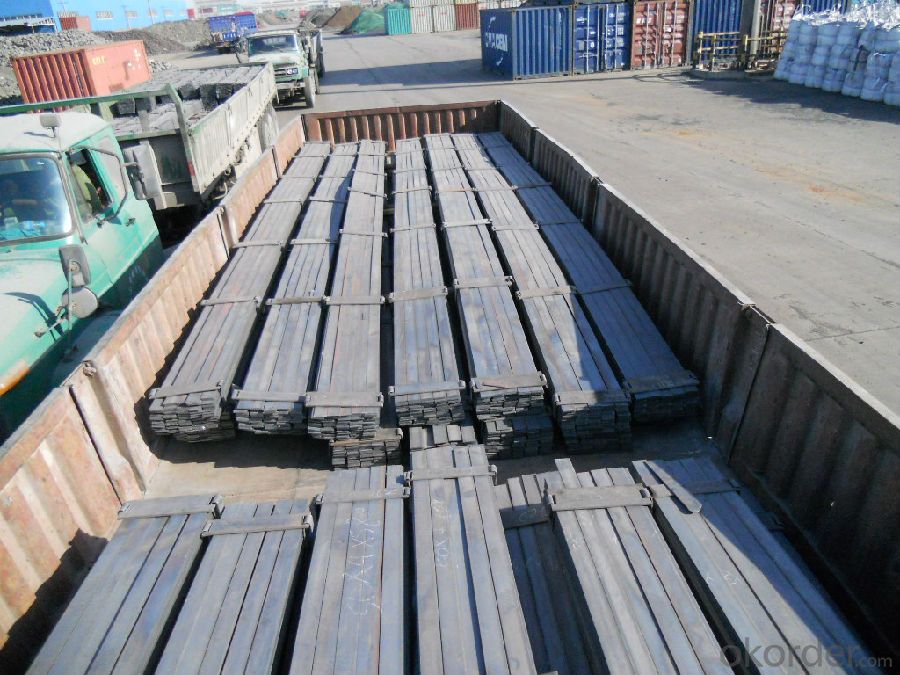
*If you would like to get our price, please inform us the size, standard/material and quantity. Thank you very much for your attention.
- Q: Are steel flat bars suitable for marine or saltwater applications?
- Due to their vulnerability to corrosion, steel flat bars are generally unsuitable for use in marine or saltwater settings. When exposed to saltwater or other corrosive surroundings, steel flat bars can rapidly rust and degrade. This deterioration can jeopardize their structural strength, rendering them unfit for marine use where they would be consistently exposed to saltwater. To guarantee longevity and durability in saltwater applications, it is advisable to opt for materials explicitly engineered for marine environments, such as stainless steel or corrosion-resistant alloys.
- Q: Can steel flat bars be used for fencing or security purposes?
- Yes, steel flat bars can be used for fencing or security purposes. They are durable, sturdy, and can provide a strong barrier for protection.
- Q: Can steel flat bars be galvanized or coated with other materials?
- Yes, steel flat bars can be galvanized or coated with other materials.
- Q: How do you store and transport steel flat bars safely?
- To ensure the safe storage and transportation of steel flat bars, it is essential to follow several important steps: 1. Stack the bars correctly: Proper stacking is crucial in preventing damage. Align each layer of bars horizontally and evenly, distributing the weight evenly across the stack to maintain its structural integrity. 2. Provide adequate support: Prevent sagging or bending of the bars by using sturdy supports such as appropriately sized pallets or racks. Ensure that the supports can handle the weight and size of the bars. 3. Secure the stack: To avoid shifting during transportation, securely fasten the stack with straps or bands. Make sure they are tightly fastened, ensuring that the bars remain in place throughout transit. 4. Take protective measures: Steel flat bars are vulnerable to corrosion, especially when exposed to moisture. Protect them from environmental elements during storage and transportation by using protective covers or wrapping the bars in moisture-resistant materials to prevent rust or damage. 5. Use proper lifting and handling techniques: When moving the bars, employ suitable lifting equipment like forklifts or cranes to prevent accidents or injuries. Ensure that the equipment is capable of handling the weight of the bars and that operators are trained in safe lifting practices. 6. Considerations for long-distance transportation: If transporting the bars over long distances, it may be necessary to utilize specialized shipping containers or trucks equipped to handle heavy loads and provide adequate protection from external elements. By adhering to these guidelines, you can minimize the risk of damage, accidents, and corrosion, ensuring the safe delivery of steel flat bars to their intended destination.
- Q: How do steel flat bars compare to stainless steel flat bars?
- Steel flat bars and stainless steel flat bars are two different types of materials that have different properties and uses. Steel flat bars are typically made from carbon steel, which is an alloy of iron and carbon. They are strong, durable, and have good tensile strength. Steel flat bars are commonly used in construction, manufacturing, and engineering applications due to their high strength and affordability. However, they are susceptible to corrosion, especially when exposed to moisture or harsh environments. On the other hand, stainless steel flat bars are made from an alloy of iron, chromium, and sometimes other elements like nickel or molybdenum. The addition of chromium gives stainless steel its corrosion-resistant properties, making it highly resistant to rust and staining. Stainless steel flat bars are widely used in industries where corrosion resistance is crucial, such as food processing, chemical processing, and marine applications. In terms of strength, steel flat bars are generally stronger than stainless steel flat bars. However, stainless steel flat bars have superior corrosion resistance, making them the preferred choice in environments where rust or staining is a concern. Additionally, stainless steel flat bars have a more aesthetic appearance due to their shiny and polished surface. Ultimately, the choice between steel flat bars and stainless steel flat bars depends on the specific application and requirements. If strength and affordability are the primary concerns, steel flat bars may be the better option. However, if corrosion resistance and a polished finish are essential, stainless steel flat bars are the preferred choice.
- Q: What are the different surface finishes for steel flat bars?
- There are several different surface finishes for steel flat bars, including hot rolled, cold rolled, mill finish, brushed, and polished. Each finish offers a different appearance and level of smoothness, catering to various aesthetic and functional requirements.
- Q: How do steel flat bars compare to carbon fiber flat bars?
- There are distinct differences between steel flat bars and carbon fiber flat bars in terms of their material composition, strength, weight, and applications. Steel flat bars, made from various grades of steel, possess exceptional strength and durability. They exhibit high resistance to bending, breaking, and deformation, making them suitable for heavy-duty purposes like construction, manufacturing, and structural support. Moreover, steel flat bars are easily accessible and cost-effective compared to carbon fiber flat bars. On the contrary, carbon fiber flat bars consist of carbon fibers embedded in a polymer matrix. This combination creates an incredibly lightweight and robust material. Carbon fiber flat bars have a remarkable strength-to-weight ratio, making them perfect for applications where reducing weight is crucial, such as aerospace, automotive, and sports equipment. Furthermore, they display excellent resistance to corrosion and fatigue, ensuring longevity even in harsh environments. While steel flat bars offer superior strength and affordability, carbon fiber flat bars excel in weight reduction and specific applications that require lightweight and high-strength materials. The choice between the two depends on the specific requirements of the project or application.
- Q: How do steel flat bars contribute to the fire resistance of structures?
- Steel flat bars contribute to the fire resistance of structures in several ways. Firstly, steel is a non-combustible material, which means it does not burn or contribute to the spread of fire. This property alone makes steel flat bars an excellent choice for construction in fire-prone areas. Additionally, steel flat bars have a high melting point compared to other materials commonly used in construction. This means that in the event of a fire, steel flat bars will maintain their structural integrity for a longer period of time, providing a secure framework for the building. This is crucial for the safety of occupants and firefighters, as it allows for a longer period of evacuation and firefighting efforts. Furthermore, steel flat bars can act as fire barriers, preventing the spread of flames from one area of the structure to another. When used in conjunction with fire-resistant materials such as gypsum board or concrete, steel flat bars can create compartmentalized spaces that contain the fire, limiting its ability to spread and minimizing the damage caused. Moreover, steel flat bars can help to reinforce the overall strength and stability of a structure, even under extreme heat conditions. This is due to the high tensile strength and durability of steel. By incorporating steel flat bars into the structural design, buildings can be better equipped to withstand the effects of fire and maintain their load-bearing capacity. In summary, steel flat bars contribute to the fire resistance of structures by being non-combustible, maintaining their structural integrity at high temperatures, acting as fire barriers, and enhancing overall structural strength. These properties make steel flat bars an essential component in fire-resistant construction, ensuring the safety and longevity of buildings in the face of fire hazards.
- Q: Do steel flat bars have a specific thermal conductivity?
- Steel flat bars indeed possess a distinct thermal conductivity. This property gauges the material's proficiency in conducting heat. Steel is renowned for its elevated thermal conductivity, enabling the efficient transfer of heat. Nevertheless, the precise thermal conductivity of steel flat bars may fluctuate depending on the particular composition of the steel alloy employed, alongside additional factors like temperature and pressure.
- Q: How do steel flat bars compare to other materials like aluminum or wood?
- Steel flat bars are typically stronger and more durable than materials like aluminum or wood. They have a higher tensile strength and can withstand heavier loads and impacts. Additionally, steel is more resistant to warping, rotting, or cracking, making it a more reliable choice for structural applications. However, steel flat bars are generally heavier and may require additional corrosion protection compared to aluminum. Wood, on the other hand, may be more aesthetically pleasing for certain applications but lacks the strength and durability of steel. Ultimately, the choice between steel, aluminum, or wood depends on the specific needs and requirements of the project.
Send your message to us
GB Standard Steel Flat Bar with High Quality 50mm
- Loading Port:
- Tianjin
- Payment Terms:
- TT OR LC
- Min Order Qty:
- 25 m.t
- Supply Capability:
- 15000 m.t/month
OKorder Service Pledge
OKorder Financial Service
Similar products
Hot products
Hot Searches
Related keywords
